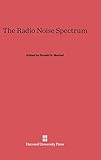The Radio Noise Spectrum / ed. by Donald H. Menzel.
Material type: TextPublisher: Cambridge, MA : Harvard University Press, [2013]Copyright date: ©1960Edition: Reprint 2014Description: 1 online resource (183 p.) : illustratedContent type:
TextPublisher: Cambridge, MA : Harvard University Press, [2013]Copyright date: ©1960Edition: Reprint 2014Description: 1 online resource (183 p.) : illustratedContent type: - 9780674180857
- 9780674180871
- 621.38411
- online - DeGruyter
- Issued also in print.
| Item type | Current library | Call number | URL | Status | Notes | Barcode | |
|---|---|---|---|---|---|---|---|
 eBook
eBook
|
Biblioteca "Angelicum" Pont. Univ. S.Tommaso d'Aquino Nuvola online | online - DeGruyter (Browse shelf(Opens below)) | Online access | Not for loan (Accesso limitato) | Accesso per gli utenti autorizzati / Access for authorized users | (dgr)9780674180871 |
Frontmatter -- Preface -- Contents -- 1. Man–Made Radio Noise -- 2. The Aurora and Radio Wave Propagation -- 3. Ionospheric Scintillation of Radio Waves of Extraterrestrial Origin -- 4. Meteor Scatter -- 5. Electromagnetic Emission from Meteors -- 6. Whistler-Mode Propagation -- 7. The Radio Spectrum of Solar Activity -- 8. Natural Background Noise at Very Low Frequencies -- 9. Solar Whistlers -- 10. Noise of Planetary Origin -- 11. Correcting Noise Maps for Beamwidth -- 12. A Study on Cosmic Radio Noise Sources -- 13. Interstellar Hydrogen -- Index
restricted access online access with authorization star
http://purl.org/coar/access_right/c_16ec
This modern era has had many names: the golden age, the machine age, the atomic age, the electronic age, and so on. One further title, hitherto unpublicized, it eminently deserves: the age of noise. Man has compounded the natural noise that preceded his existence on the earth until no point on this globe is free from it. Even in the desert's hush, radio waves pervade the air and provide a source of potential noise. The shorter waves escape from the earth and fill interplanetary space with the mingled clamor of FM, TV, radar, and other insistent voices. This book deals with the important problem of radio noise, its sources, whether manmade or natural, over the known range of frequencies. Certain of these contributions will interest the communicator, enabling him to estimate the potential interference from various types of sources. Other contributions deal mainly with scientific problems, such as the origins and significance of certain characteristic noise radiations. The contributors to this book are experts on the various phases of radio noise. The individual chapters derive from papers presented at a Conference on Radio Noise, held at Harvard College Observatory, April 22, 1958.
Issued also in print.
Mode of access: Internet via World Wide Web.
In English.
Description based on online resource; title from PDF title page (publisher's Web site, viewed 26. Apr 2024)


